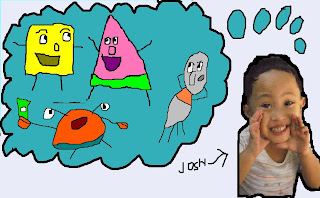Mornings are busier than the afternoon. Well, in our house at least. Here, people paced from place to place just so that they could beat the clock and make it through their respective schedules. Frantic searches for lost school items are often a scene. Tupperwares left on the round dining table, the owner temporary oblivious at the moment, come recess or lunch they’ll sure wish they took their time. But it’s a different day yay Nieves and my mom were more didactic, more softly spoken about the lessons of my nephew even preparing a special breakfast. This could only mean one nostalgic thing—examination day!
The test taker is Joshua. He’s on kinder now. Having taught him in few of his assignments I know what he’s examination would be like: naming of shapes; naming of colors; the ecosystem. True to my hunch all of these topics were covered. The first part was identification by encircling the answer, and matching type. Yay Nieves—the narrator of the story who fetched Josh on that day—told us that the kid answered the items swiftly with great air of confidence.
The second part was drawing. At home Josh drew a lot (not to mention even on walls) that made me allude that this test would be over in a jiffy. As what he did on the first part of the exam Joshua quickly finished the task. He was free to go earlier. However, the teacher noticed something odd and disturbing about the kid’s drawing that it pushed her to prod for an explanation.
They were asked to draw a picture of their families (a typical task for pre-school kids). While the rest of the kids drew a semblance of their families Josh’s papers were more “bizarre” (for the teacher). When she asked the child what the kid drew Josh replied “si Spongebob po at and kanyang pamilya…” The teacher pointed to another set of characters that were different from the Spongbobs and asked about it. “Ang kapitbahay po nila si Patrick at ang kanyang pamilya.” Josh proudly replied. The teacher hiding her laughter bit her lips nodded and waved goodbye to her student.
At home we all burst into a wild chuckling. We asked yay Nieves to repeat the story whenever there were new arrivals. Each and every time we howled full of mirth with that anecdotal. Josh watched us with his smile while his skin blushed. Yet behind those jokes I somewhat believed that it was not out of misunderstanding nor was it due to the kid’s inability to comprehend did he made such drawing. Josh is a smart kid though he can’t read yet (he could recognize and write alphabets) his intelligence doesn’t come with education—I just can’t put my fingers to it—but it emanates deep inside the core of his being.
Often we find him busy in front of the TV watching his favorite cartoons. But when he speaks out his mind he usually astonishes me with his questions even more his answers. I remembered once when I was so down trodden by the enigmatic formulary of statistics and he spoke, “o hayaan mo nalang muna yan, maya mo na sagutan” he said with great air of concern, “relax ka muna tito baka matulad ka kay Squidward.” Succinctly I was pulled out of the Labyrinthine worries that I have. I felt he was the elder and I am the kid. I flashed a smile of relief and patted his head.
Perhaps, I was a Squidward in their eyes when I seem to direct my attention at paper works, assignment, good etiquette, and social formality. To them that is simply boring. Sometimes we are Mr. Krabbs concerned with money, work, and yes, more money. Or maybe we are Plankton in his egotistical and conceited daydreaming submitting the world into his tyranny, and of course, getting that secret Krabby patty formula. While it is funny and comical on TV it may not be so humorous at real life.
Although, this things are unavoidable because we need to pay bills and abide the social standards these kids (my three nephews) led by Joshua, the eldest, are giving me something of benefit for me. Once in a while I give them lessons: alphabet, reading, counting, and some other things. While them, they teach me to see the world as a child sees them, though I confess I might see it while my eyes were squinting.
Returning to his work, while he drew something that will not be graded in excellence, I find his work authentic and rich with imagination. He was brave enough to show the world who he is regardless of whether people might laugh at him or grade him lowly. And how many times have I caught myself draping myself with an edifice of etiquette for approval or in fear of failure. For a child it is okay to trip and fall there is always tomorrow anyways, wounds heal. They enjoy themselves every moment by being simply the kid that they are.
In Bikini Bottom anything is possible. For isn’t it Spongebob himself, along with Patrick Star, who created wonders out of a box armed only with imagination and believing themselves. Josh has this innately. After all, he is living in the time of Spongebob and other heroes. In their way anything could be done. Impossible didn’t exist. Yes, amidst of their blunders and histrionics they were their own, well, genius.
Whenever I am with the kids I sure do remind myself who the student is and who is the teacher; who teaches and who learns. For children are teachers too without even reading or writing. And while I find it hard to live without worries I know that I could be able to understand the enigmas of their tutelage after all I am once, too, in their world—a child.

